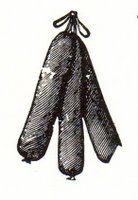 Today, June 13th …
Today, June 13th …The English writer Dorothy L. Sayers, the creator of Lord Peter Wimsey, the aristocrat amateur detective, was born on this day in 1893, at the tail-end of the Victorian era. This eminently quotable writer must have loved food, surely? Why else would she say things like:
“What? Sunday morning in an English family and no sausages? God bless my soul, what’s the world coming to?”
“I have never regretted Paradise Lost since I discovered that it contained no eggs-and- bacon”.
The eggs, bacon, and sausages beloved of Dorothy Sayers are merely the distillation of what was, until the Great War, a much larger breakfast spread - the English firmly believing that one must “breakfast like a king, lunch like a prince, and dine like a pauper” – which modern dietitians would probably support in principle.
The Victorian gold-standard was of course duly recorded by Mrs Beeton, and her comments about dishes appropriate for breakfast should be read in their entirety. Several other cookery books of the era had daily menu suggestions and recipes, which are very enlightening.
For June 13th breakfast, if you were from a household of “moderate circumstances”, “Cre-Fydd’s Family Fare”(1869) suggested: “Tongue, broiled ham, fried eggs, fruit, rolls.”
A decade later, Phyllis Browne’s “A Years Cookery” suggested “Potted Beef, Buttered Eggs, Scones, Dry Toast, Watercress, Brown and White Bread and Butter, and Milk Porridge” - this for a family with “moderate income, moderate domestic help, and ordinary kitchen utensils”.
The balance of breakfast then was firmly on the savoury side, and there is one savoury concept much beloved of the English - the Anglo-Indian “devil” – eminently suitable for the peculiarly English final savoury course to a long meal, as well as for supper and breakfast.
So for those who cant think of breakfast without eggs, from those lovely ladies Mrs Leyel and Miss Hartley in “Gentle Art of Cookery” (1920’s), here is a recipe for:
Devilled Eggs.
Eggs, two tablespoonfuls of Worcester sauce, one dessertspoon of French mustard, one ounce of butter, thick brown gravy, salt and cayenne pepper.
Boil the eggs for eight minutes; peel them, cut them in half, and remove the yolks. Make a paste of the yolks, cayenne and salt. Cut a tiny piece off the bottom of each half white to make it stand up, and fill each one with the paste. Pour over them a sauce made of the gravy, French mustard, and Worcester sauce. Serve very hot, and sprinkle them with chopped parsley.
Tomorrow: The Chicken Marengo Story.
On this Topic …
The eccentric William Kitchiner had something to say about “devils” in “The Cook’s Oracle” (1817).
Isabella Beeton's comments on breakfasts are here.
Quotation for the Day …
Oysters are the usual opening to a winter breakfast…..indeed they are almost indispensible. Grimod de la Reyniere.
oooooh, I'm soo craving a fry-up, after reading today's post!!!
ReplyDeleteWhat! not veal and ham pie?
ReplyDeleteThat actually sounds good!
ReplyDeleteWhen I finish writing my definitive book on "The Pie: A Celebratory History" you two gals are gonna be amongst the first proof-readers.
ReplyDeletehi, I liked ur article, I m very interested in ancient recipres of world which are unfortunately lost in the age of resturant chains. Money minded society have faded grandmothers delights..
ReplyDelete